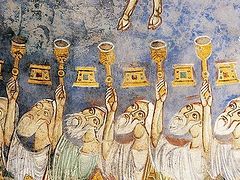Source: Apologia Pro Ortho Doxa
March 30, 2016
In contemporary evangelicalism, the writings of the Apostle Paul are conventionally interpreted in terms of a strictly forensic doctrine of justification. According to this reading, mankind has, in sinning, incurred the just wrath of God. The sins of mankind were counted (imputed to) as if they were Christ’s, and when one exercises faith in Christ, one’s sins are recognized as punished in his person and Christ’s active obedience is imputed to the account of the believer. Paul is understood to have taught this in speaking of “God’s righteousness” coming through “faith in Jesus Christ” by the means of “propitiation” (Romans 3:21-25). Yet, difficulties with this understanding emerge in a careful reflection on the entirety of the letter to the Romans and the Pauline corpus as a whole. If this is the central argument articulated by Paul in the letter to the Romans, certain portions of the letter seem to be falling off the edge of the main point. If the point of Romans 2 is that no person can fulfill the law before God, then why does Paul twice (2:13-14, 2:25-29) appear to set up a category of Gentiles who keep the law? Furthermore, how does this reading make sense of Paul’s own connection to Israel’s story? In what way did Paul believe the work of Jesus had fulfilled his messianic task?
It is the argument of this article that, instead of Paul teaching a purely forensic doctrine of justification apparently disconnected from Israel’s story, Paul teaches justification in and through divinization. For Paul, the fundamental problem which Israel was chosen and called to address was the problem of death. Adam, in seeking after that which was not God, lost the glory of God, the glory which gives life to the body. As such, man began to die. God called Israel, the light of nations, to solve this problem through her obedience to the Torah. Yet, Israel herself has been unfaithful, and Israel’s unfaithfulness has raised the question of the faithfulness of God through Israel. Jesus is understood to be simultaneously the personal embodiment of the people of Israel and the personal embodiment of Israel’s God. When he is faithful unto death, God declares him righteous precisely by raising him from the dead. An individual Christian is justified, or declared righteous, when that Christian shares in the faithfulness of Jesus the Messiah. Since Jesus is the personal embodiment of the God who is radiant with divine glory, sharing in his life by the Spirit restores the “glory of God” which had been lost by Adam, and thus solves the problem of death. Hence, Paul’s doctrine of justification is a doctrine of divinization, but it is not an abstract, de-historicized doctrine of divinization. Instead, it is rooted and grounded in Israel’s story and Israel’s Scriptures.
Paul’s argument begins in Romans 1, where Paul declares that the “righteousness of God” has been revealed in the gospel of Jesus. This phrase became important in Reformation theology, where it was understood to refer to a collection of merit which could be imputed to the believer. This is not, however, what the phrase means in the Old Testament. In texts like Isaiah 40-55, the “righteousness of God” is God’s own faithfulness to fulfill his covenant to Israel in a great act of salvation. In Isaiah 45:23, for example, “righteousness” is the foundation upon which God sends forth a word which will heal and redeem Israel from her exile. Importantly, this sense of “righteousness” appears in the contexts of passages which Paul quotes. In Romans 3:14-15, Paul quotes Isaiah 59:7-8, which goes onto describe how YHWH put on righteousness as a breastplate in order to ride forth and redeem Israel. Likewise, in Romans 3:20, Paul alludes to Psalm 143:2, and 143:1 speaks of God’s “righteousness” as the power by which God saves and redeems his people.
A proper reading of Romans 1, then, must be Israel-centric and covenant-centric. Paul is discussing the way in which God has been faithful to Israel in the messianic work of Jesus. The problem of Romans 1 is the universal extent of the sin of Adam. Paul writes that the nations “seeking to be wise, have become fools” and have “exchanged the glory of the immortal God for images.” These two phrases are important, because their Old Testament background illustrates the direction of Paul’s argument. Those who “sought to become wise” are Adam and Eve, who in Genesis 3:6 “saw that the tree was to be desired to make one wise.” The nations have recapitulated the sin of Adam. The latter phrase is an allusion to Psalm 106:20, where it is Israel who exchanged the glory of God for an ox. That Paul applies a text about Israel to the Gentiles anticipates an important turn in his argument: Israel, despite being called to address the problem in which the world was mired, is itself part of that problem.
That Paul describes the glory as that of “the immortal God” anticipates 2:7, where the person justified at the Last Judgment receives “glory, honor, and immortality.” The “glory” is that which animates the resurrected body, which is why Paul says that Christ was raised by the “glory of the Father” (6:7) and that glory will be “revealed in us” at the resurrection of the dead (8:18). The fundamental problem faced by human beings, then, is that, through idolatry, they have ceased to share in the divine glory, thereby forfeiting immortality. From this point, Paul looks toward the Final Judgment, where he declares that all men, Jews and Greeks alike, will be judged by their works. For many evangelicals, Paul here sets up an category which is impossible to fulfill. Since no person actually can fulfill the law, the argument goes, Paul will go on to declare that Christ has fulfilled it in our place and imputed that fulfillment to us. Yet, this is not the direction which Paul’s argument takes. Instead, in 2:13-14, Paul says that the “doers of the law will be justified” and gives an example of Gentiles who indeed fulfill the law. While it is common to see this as a reference to a “righteous pagan”, this is almost certainly not what Paul had in mind. Instead, he says that Gentiles do the law because it is “written on their heart.” This phrase is a quotation from Jeremiah 31:33, where it refers to the Torah written on the heart of each Israelite after the promised new exodus, so that Paul is referring to beneficiaries of the new covenant. Paul, through allusion, hints at the fact that there are Gentiles in whom Israel’s Torah is fulfilled. The same strategy appears in 2:25-29, where Paul speaks of those who are “physically foreskinned” but whose hearts are circumcised. This is a direct reference to Deuteronomy 30:1-6, where Moses promises that after Israel’s exile, God will circumcise the hearts of his people, so that they might obey the law, so that they might “live.”
It is important at this point to properly read both 2:17-24 and 3:1-8, since the former is very often underinterpreted and the latter is often ignored altogether. In Romans 2:17-24, Paul addresses the Jew who “relies on the law and boasts in God”, but then challenges him on whether he keeps the law himself. Usually, this is understood to refer to a Jew who boasts that he is better than the Gentiles just condemned by Paul, but this subtly misses the point. The argument of Paul’s interlocutor is not that he is better than the Gentiles, but that Israel, as the light of the world, is the solution to the problem. This is why he is referred to in 2:19 as a “guide to the blind, a light to those in darkness.” This line of thought forms the foundation of 3:1-8, where the question is why, if Israel has failed in her calling, God called Israel in the first place. Paul writes that Israel was “entrusted with the oracles of God.” Everywhere else in Paul, “entrusted” (1 Thessalonians 2:4, Galatians 2:7) refers to something given for the sake of blessing others. To say that Israel was entrusted with the oracles of God is to say that Israel’s Torah was the means by which they were to shine light on the nations, as in Deuteronomy 4:6-8.
In Romans 3:3, then, the “unfaithfulness” of Israel is not an abstract disobedience, but precisely unfaithfulness to Israel’s vocation. This raises the question of whether God, then, will remain faithful to the world through Israel, which is articulated in terms of the “righteousness of God.” Given, as argued above, that the righteousness of God refers to God’s own saving faithfulness to Israel and to the world through Israel, the question being raised is whether God is going to remain righteous in this sense even though Israel has been unfaithful to her side of the covenant. Understanding that both Israel’s faithfulness and God’s faithfulness is in question is essential for properly comprehending the contours of Paul’s own understanding of the work of Jesus as Messiah, which is shaped by Isaiah 59.
As noted above, Romans 3:14-15 is a quotation from Isaiah 59. Understanding the fuller context of Isaiah 59 illuminates the argument which Paul will make in 3:21-31. In Isaiah 59, the Lord looks upon Israel’s unfaithfulness, and it is this portion which Paul quotes in Romans 3:14-15. The Lord then puts on a breastplate of righteousness to himself to accomplish Israel’s task(59:17-18), puts his spirit on the remnant of Israel (59:21) and then gathers the nations to Zion (60:1-3). Given that Paul is discussing Israel’s election as light of the nations and Israel’s failure to carry out the vocation inherent in her election, that Paul quotes a portion of this text is highly significant. Furthermore, the argument of the letter ends with a quotation from Isaiah 59:20 (Romans 11:26-27), setting it apart as structurally important for the theology of the argument as a whole. We see, then, that in Isaiah 59, the Lord himself is faithful to Israel as God by fulfilling Israel’s calling himself.
These two realities form the undercurrent necessary for understanding the dense argument developed by Paul in 3:21-31. Paul writes that the “righteousness of God” is through the “faith of [or in] Jesus the Messiah” for “all who are faithful.” One of the sharpest debates in contemporary Pauline studies concerns the translation of “pistis Christou.” Traditionally, this phrase has been rendered in the objective, so that it translates “faith in Jesus Christ.” More recently, however, a number of scholars have proposed that it be translated in the subjective genitive, so that it is “the faithfulness of Jesus Christ.” The latter translation should be preferred for several reasons. First, in Romans 3:22, the phrase “for all who are faithful” becomes repetitive if pistis Christou is translated in the subjective: “faith in Jesus Christ for all who have faith.” On the other hand, if pistis Christou is rendered in the subjective, Paul is saying that the “faithfulness of Jesus Christ” is for the benefit of “all who are faithful.” Second, the subjective genitive fits the sense of “righteousness of God” argued above. It makes little sense to say that God’s covenant promises to save and redeem Israel have been fulfilled in the faith of an individual believer. Instead, it makes much more sense to say that Israel’s long story has come to its climax in the story of the faithful Messiah, who sums up Israel in himself.
Understanding that the phrase is to be translated “through the faithfulness of Jesus the Messiah”, we can see how 3:22 connects to 3:3-5. In 3:3-5, the righteousness of God was called into question by Israel’s unfaithfulness. Since God had promised to be faithful to the world through the obedience of Israel, Israel’s disobedience brings God’s promises into question. Consequently, both the faithfulness of God and the faithfulness of Israel are subject to dispute. For Paul to speak of the “faithfulness of Jesus Christ” as enacting the “righteousness of God” means that it is the faithfulness of the Messiah which answers both problems. As is appropriate, given Paul’s citation of Isaiah 59, the Messiah is understood as both Israel being faithful to God as Israel and God being faithful to Israel as God. This explains precisely why it is that a person is not justified by the works of the Torah. For Paul, Israel’s unfaithfulness to the Torah is answered by the Messiah’s faithfulness in going unto the death of the cross. As such, it is the faithfulness of the Messiah which is the quintessential act of obedience to the Torah. He is the one in whom Israel’s election is focused, so that the boundaries of the people of God are not marked out by food laws, sabbath, and circumcision, but by inhabiting the faithfulness of Jesus Christ, which is what it means to “establish the law” (3:31).
It is likewise because Christ is both the embodiment of God and the embodiment of Israel that the people of God are reconstituted around him as a people who share in the divine glory. This is why Paul immediately follows “the righteousness of God through the faithfulnes of Jesus Christ for all who are faithful” with noting the universality of deprivation of the glory of God. The human race forfeited the divine glory through idolatry, but conformance to the image of Christ by incorporation into his faithful death (and thus, resurrection) restores the glory which brings immortality. In fact, the word “image” is only used twice in the letter to the Romans. In 1:23, it refers to idolatrous images through which the glory of God is forfeited, whereas in 8:29, it refers to the “image of his Son” which leads a person in Christ to be “glorified” (8:30).
Understanding Paul’s line of thought in this fashion enables the various themes discussed in 3:21-31 to nest together, rather than being played against one another. The doctrine of justification is forensic, but its forensic nature is rethought around the way in which Jesus was justified. Jesus was pronounced “guilty” in being crucified, but God overturned that verdict precisely in glorifying His body. For a believer to be justified, then, means to share in His death and thereby share in the glory which raised Christ Jesus from the dead. Justification is neither exclusively forensic nor exclusively participatory. A full appreciation of Paul’s argument requires both to be understood together. Likewise, the unity of Jew and Gentile fits into this fabric. Israel was called and chosen to redeem the world through obedience to the Torah. Israel, however, had an uncircumcised heart just as the Gentiles did. As such, Israel’s election devolved onto the singular person of Jesus the Messiah, who sums up Israel in himself. Because the election of Abraham’s family fell onto a single person, what it means to be a descendant of Abraham is rethought around the experience of that one Jesus. The identity badge of the people of God is then not the “marks of circumcision” but instead, the “marks of Jesus” (Galatians 6:16). Finally, when Paul is understood against the backdrop of his Scriptures, the biblical roots for the doctrine of divinization shine forth. The one who was the embodiment of Israel was also the embodiment of God, radiant with divine glory. Since the identity of Israel is mapped around this person, to be constituted as an heir of Israel “not according to the flesh, but according to the Spirit” means to share in the divine glory which animates the resurrected body. To be justified is to be glorified.




